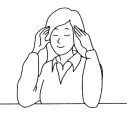1. PPP
P - PRESERVE - Precious Life
P - PREVENT - Things becoming worse
P - PROMOTE - Recovery
2. DTD
D - DIAGNOSIS - to know the problem - Look, Listen, Feel & Smell
T - TREATMENT - before taking to the doctor
D - DISPOSAL - to the hospital
3. FOUR LACKS
During diagnosis check for
A.LACK OF BREATHING (15 - 20 per minute)
B.LACK OF HEART BEAT (60 - 80 per minute)
C.LACK OF BLOOD (4 to 5 litres)
D.LACK OF CONSCIOUSNESS (shake & shout)
4. ABC
Keep brain supplied with oxygen by follwing ABC of Resusciation
A - AIRWAY - Open the airway
B - BREATHING - Maintain Breathing
C - CIRCULATION - Maintain Circulation
5. RECOVERY POSITION / TRANSPORT
Friday, December 5, 2008
Thursday, December 4, 2008
Helpful Stretches for Your Mini Work Break
It is recommended that you should take a mini-break every 45 to 60 minutes. While you are on your break, try some of these stretches. It will help you relax those tense muscles.
| Whole Body Stretch: Stand and stretch your arms overhead for 10 to 20 seconds. Repeat 3 times. |  | |
 | Shoulder-Blade Pinch: With your fingers interlaced behind your head, pinch your shoulder blades together for 8 to 10 seconds. Repeat several times. | |
| Shoulder Rolls: Slowly roll your shoulders 5 times, forward, then 5 times backward. |  | |
 | Triceps Stretches: Holding your left elbow with your right hand, gently pull your left elbow behind your head until you feel a stretch (your left hand should rest gently on the base of your neck). Hold for 30 seconds. Repeat in the opposite direction. (If it’s too hard to start with a 30 second stretch, do 3 sets of 10-second stretches or 2 at 15 seconds.) | |
| Hug Stretches: Grasp your right elbow in the palm of your left hand. Pull your arm across your body, as if you are bugging someone. Hold for 15 to 20 seconds. Repeat in the opposite direction. |  | |
 | Chin Tucks: Keep your head level and pull your chin down as if you were making a double chin. Hold for 5 seconds. Repeat 3 times. | |
| Arm and Hand Shakes: With your arms hanging loosely at your sides, shake your arms gently for 5 to 10 seconds. |  | |
 | Trapezius Stretches: Sit on both hands, palms up. Tiltyour head to one shoulder and hold this position for 10 seconds. Repeat 3 times for each shoulder. | |
| Hand Stretch: Make a fist with each hand, but don’t squeeze. With your fingers bent, straighten your hand only to the first set of knuckles. Hold for 3 seconds, then straighten your fingers. Repeat 3 times. |  | |
 | Wrist Circles: Without moving your arms,slowly circle your hands, 3 times in each direction. | |
| Wrist Raises: Without moving your arms, slowly raise and lower your hands 5 times. |  | |
 | Slow and Fast Blinks: Blink slowly, allowing your eyes to stay closed for a few seconds. Repeat 10 times. Then blink lightly and quickly 10 times. End with a relaxing temple massage. | |
| Shift Focus: Find the object that is farthest away from you and focus on it for 5 to 10 seconds. Blink and breath deeply. Then look back at your screen. Repeat 3 times. |  | |
 | Close Your Eyes: close your eyes and cover them the palms of your hand for to 30 seconds. Take long, slow, deep breathes. Relax your face, brow and Don’t squeeze your eyes shut. | |
ALL INDIA TOLL-FREE Terror Help-line "1090"
In case you come across any suspicious activity, any suspicious movement or have any information to tell to the Anti-Terror Squad, please take a note of the new ALL INDIA TOLL-FREE Terror Help-line "1090". Your city's Police or Anti-Terror squad will take action as quickly as possible.
This is a toll free number and can be dialed from mobile phones. Moreover, the identity of the caller will be kept a secret.
Please try to aware every citizen of India about this facility.
Remember that this single number 1090 is valid all over India.
This is a toll free number and can be dialed from mobile phones. Moreover, the identity of the caller will be kept a secret.
Please try to aware every citizen of India about this facility.
Tuesday, December 2, 2008
CTC - Critical Time for any Crisis...
This post is intended to just give a brief idea of what CTC is. More details will be posted in coming days in this blog.
Crisis - This word may have lot of meaning within it. It may be an accident, natural calamities, riots, terror attacks, building collapse, etc. But whatever the crisis may be, the first few minutes are the very very important ones, that can alter the course of the extent of the damage caused by that crisis. And this time differs based on the type of crisis.
For example, the Critical time for any kind of accident is the first 3-4 minutes. One can even save a person's life , from certain death, when those critical time is not wasted and spent in the way it has to be spent. And the very recent example how that Critical Time was mishandled, can be attributed to the Mumbai Terror Attack. And the Military personnel say that the critical time for any terror threat/attack, is first 20-30 mins, within which the whole plan of the terrorists can be nullified. Unfortunately, this CTC was poorly handled, which lead to about 40hours of struggle.
What should we do in that CTC? What we should not do in that CTC? - As CTC depends the type of crisis, the answers for these questions also depends on the type of crisis. We'll try to give more details in this blog about these.
Subscribe to:
Posts (Atom)